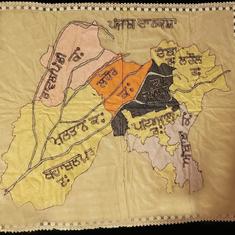I assured her that we were lucky. Apart from the breakdown in mobile services for a few days during the unprecedented heavy rain, we were just fine. We even had uninterrupted power supply.
A shadow passed over her face; I kicked myself for not being more sensitive.
As the city recovers from the disaster, we are still looking for ways to make sense of and cope with the situation. But I wonder if we are ready to move on? Each of us is dealing with the aftermath differently, and we are at different points of the coping curve – if there is such a thing.
White lies
This complex mixture of emotions brewing inside me is wholly undeserved, especially when you consider the members of my extended family who needed to be evacuated and friends whose temporarily abandoned homes got burgled. And when you consider the plight of those living in the slums that got washed away and reduced to rubble, my counting blessings is self-indulgent to the point of vulgarity.
After the disappointment of my first post-floods workplace conversation, I decided to change tack. I began assuring colleagues that my mobile phone had stopped working during the disaster and that we went without power for an entire day. I also said the inverter batteries died and had to be replaced – they cost as much as the dining table we were planning to buy. To make matters worse, there was a leak from the bathroom in the apartment above ours that required us to sit on the throne with a plastic sheet canopy overhead. And there was a mouse that celebrated its birthday every night with the rodent cake that I was sure would rid us of it.
I wasn’t lying about everything that had gone wrong – just vague about the timing. This approach seemed more decent than rubbing my thanked stars in someone’s face. As heavy rains batter the city, people had lost their lives, their homes, their loved ones and their faith in a benevolent god. All I had lost was sleep.
Storm brewing
It has been a fortnight of a jagged existence suspended between disturbing nightmares of rising water and busy wakefulness involving a plot outline that went from funny to morbid.
During the day, I am an image of efficiency. All the storage at home has been aired and the mold has been dealt with. I’ve switched from supporting flood relief efforts to rehabilitation. A to-do list is back. My Facebook posts have made a careful transition from the insistent flood-related alerts to the observed minutiae at the concerts during the annual music season. And I’ve finally learnt to call the Bond movie by its right name – Spectre, not Sceptre.
I’m tip-top and my life is ship-shape.
But deep inside, something unnamed lies dormant, biding its time until I am done with the day’s distractions. I push my bedtime late to ensure I fall asleep. But as soon as my head hits the pillow, my guard is down and the dam bursts. Metaphoric.
Is my mobile fully charged? What do I need to gather to protect myself and my family? I don’t know where my passport is. I chide myself for not learning to swim – it’s a life-saving skill. Then again, what if the next disaster is an earthquake or a tsunami? Or a riot following a politician's death? How prepared can one be?
I think of the Tokyo Busai – the much-coveted Japanese disaster preparedness manual – and how overwhelming it would be to remember every detailed instruction to survive every possible disaster. I berate myself for having a bad memory. I must surely be heading towards some form of dementia. Wasn’t that what happened to Iris Murdoch? And how could I even compare myself to a writer of her stature when I can’t get a plot outline down, let alone actually write my novel?
Then I think of the retired army officer and his wife who died in their home trying to escape the surging water. A key was found submerged in the inundated room and it is presumed they may have dropped it trying to escape. I imagine the desperation. The panic.
The great leveller
I’m not ready to die. I need more time. I haven't achieved anything of significance. I’ve only just emerged from many years of suspending my best self for reasons that now seem juvenile and pathetic. I am finally awake to the possibility that I determine my life. I’ve only just begun to find my purpose. I’m too young to die.
And close on the heels of that thought, comes shame, of how selfish and petulant I was being when children and young lives brimming with promise had been lost, all because they were born in a different circumstance, time and social strata. But none of these reasons – of circumstance, time and social strata – seemed to determine who would live and who would die in the floods. It was simple geography.
I try not to think of the water that crept into homes while people slept. It flowed out of a reservoir, inundated the canals, overflowed into the slums on the embankments, gushed down streets and flooded all the structures that we had arrogantly built in low-lying localities and labelled as “development”. Malls, office complexes, apartments, schools – all inundated.
Water finds its level. No matter how prepared I am, I am powerless against nature. At this point, I usually fall asleep with a lack of faith that the sun will rise the next morning.
But rise it does, and with it comes the guilt of emotions I have no right to covet. As it happens, guilt about survivor’s guilt is a very real thing.










